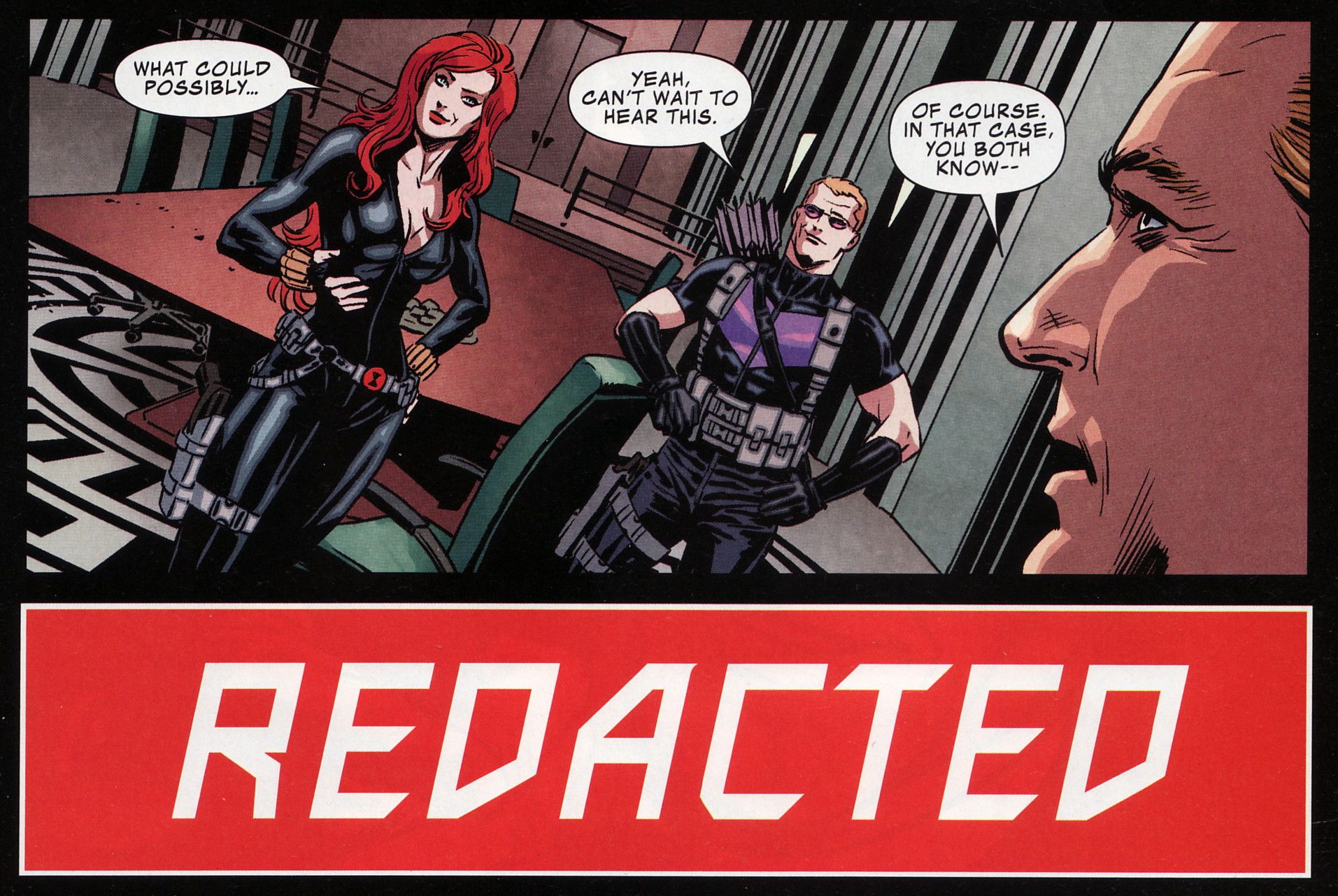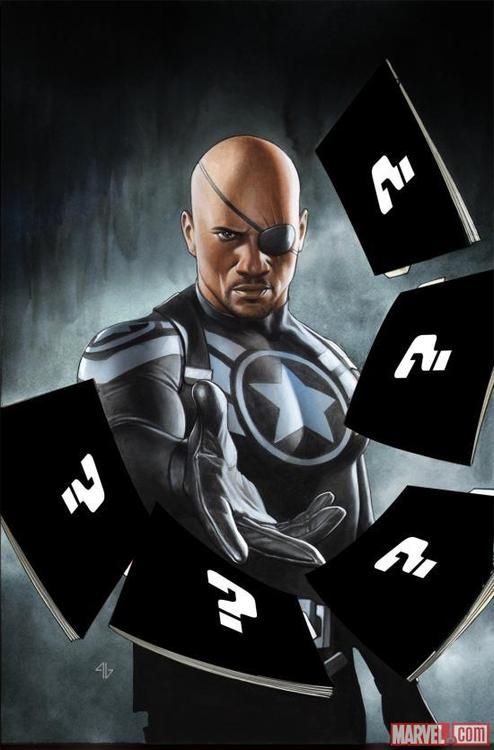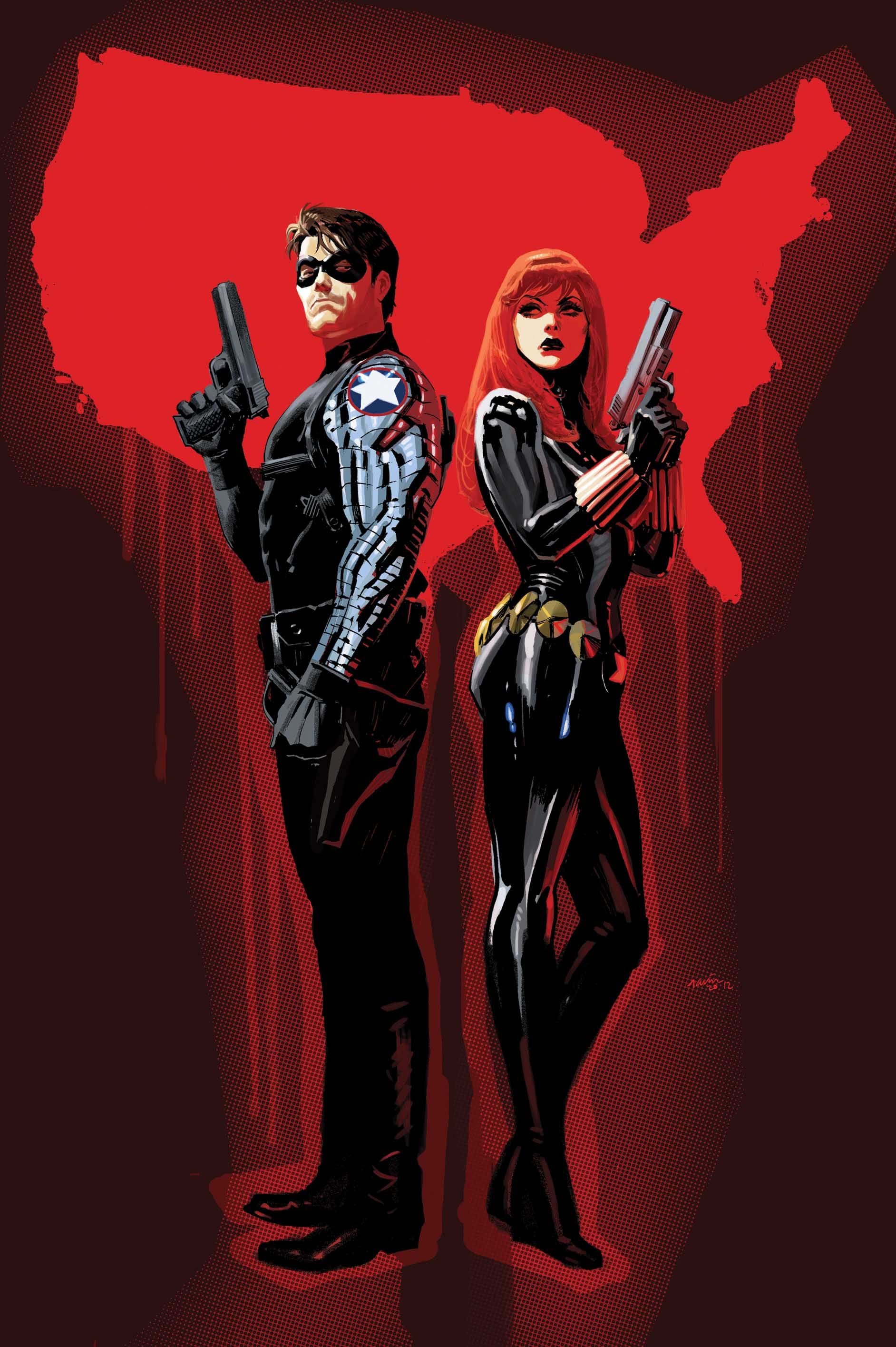I didn't talk about the first issue of the new, more NOW! Secret Avengers last week for a few reasons: First off, I try to keep things positive as I can here at The Fifth Color; I can't say I always succeed, but being fair is good goal to shoot for. Secondly, I would have wanted to talk about the ending of Rick Remender's run on the title way more than Nick Spencer's new gig. Seriously, how amazing was that last issue? Remender really pulled out all the stops on his fascinating robot revolution and really made me sit up and take notice toward the end despite what was more of a expositional start. I hope he has time to come back to his philosophical super-science take on man vs. machine, but I'm guessing it'll be awhile before Deathlok is back under his employ. Then again, the Uncanny Avengers are specifically the "non-discriminatory: Avengers group, so maybe Deathlok will be sneaking into a few more pages- and see? I told you.
Lastly, it was the day after Valentine's Day and I am a huge sap.
Thankfully, the esteemed Michael May was dashingly handsome enough to compare the new NOW! Nick Spencer spy story with the similarly cast new storyline in Kelly Sue DeConnick's Avengers Assemble. Comparing their sp-ytastic stories against one another, it was easy to see where one had suceeded at being a movie-like throwback to secret agent action and where one sadly failed.
Below, I'm going to talk about how Secret Avengers drew the short straw in comic storytelling and how that cool new 'indy look' for Marvel comics can fall flat on it's face. Join me, won't you?
WARNING: We're talking about Secret Avengers #1 and Winter Soldier #14, so grab your copies and read along!
So in Michael's thrilling "Spy vs. Spy: What’s right (and wrong) with Avengers spy comics" (seriously, so read this; he has laid out a thoughtful comparison of the two books' approaches to their subjects, and remains effortlessly good-looking), he and I agree on a lot of things, especially on the stuff that isn't said. In the pages of Secret Avengers #1, Black Widow and Hawkeye are asked to join a S.H.I.E.L.D. task force that will be given memory-erasing implants to ensure their missions remain as confidential as possible. As Hawkeye and Black Widow demand to know why they would take on such implants, the answer is swiftly redacted from our prying eyes. Next thing we know, the mission is on.
This some grad- A bull-pucky, pardon my language. Hawkeye and Black Widow are both incredibly savvy characters. and Black Widow has been in the super-spy business longer than anyone currently working at S.H.I.E.L.D.. There is just no possible way that our heroes should not have a say in the contents of their own brains, let alone not figure out how to get out of their sticky situation. Considering the events of Ed Brubaker's last story arc on Winter Soldier, Black Widow should have shot Agent Coulson in the face the moment he wanted to wash her brain.
I honestly stopped reading after Agent Coulson's big Ozymandius-like reveal that Hawkeye and Black Widow had already been implanted with the memory-wiping tech when the shook his hand at the start of the meeting. I was, and still am, bothered by the casual carelessness that came from that story point; it had such little respect for the two established characters, not to mention how petty and downright evil it made the brand new Agent Coulson out to be. Heck, I'm still smarting from the end of Winter Soldier #14, where the Black Widow is yet again recovering from some Soviet mind control and has now lost her relationship to Bucky Barnes. Bucky had the right idea that no one should be mucking around in her mind anymore, and kept his distance for the sake of her next appearances in other books and the fresh clean slate of his series for the new writer. Also, he loved her enough to respect her mind and heart, no matter the cost to his own.
For the comic reader, we deserve a better answer than a redacted agreement to this new book. Remember, we're joining up with this new team, too. Hawkeye and Black Widow are being recruited to a new team that we are being recruited to read. At this point, whatever grand answer that lies beyond the big red REDACTED box that explains this situation might not be enough to take the sour taste of brain hijacking and forced indoctrination.
The idea of brainwashing comes from a different time for book that wants to bring new readers in to a modern era. It originated with the fear of totalitarian regimes sweeping through to indoctrinate Communism through propaganda and psychological torture. It's a 1950's Red Scare phenomenon that caught the public's attention as much as gamma rays and radioactive isotopes. To bring back such an old fear to haunt our heroes is a villainous act; it's why we don't have people blinded by isotopes anymore and why we love to hate the Red Skull. That the things we put behind us could return to menace us again is as much as a nightmare as coming to high school without any clothes: treacherous, unsettling and embarrassing.
If S.H.I.E.L.D. is going to get medieval in the handling of our heroes, does this make them the bad guys again? This is the same organization that were Civil War enforcers; their respect for the super-hero community might not have changed as much as we'd like to believe in the years since the Superhero Registration Act. And while the agency's strong stance against superheroes might make ideological sense, it doesn't jibe with what I thought this book was supposed to be. Marcus Johnson is already chafing long time readers with his new name and Samuel L. Johnson stylings and this Agent Coulson isn't the lovable straight man we came to know and love in the Marvel Cinematic Universe. It seems that neither fan group would be well pleased by the new turn of events. If their targets are going to remain so secret that they'll erase the memories from their own agent's minds, then why bother investing in the dangers they're going to face? They're just going to be forgotten or left as odd loose ends to dangle around as the plot needs, not as any long term accomplishment or triumph. If S.H.I.E.L.D. is really doubling down on nefarious schemes, what does this mean for books like the Indestructible Hulk where they seem to have a different (if not simply more subtle and well planned) motivation?
"Redacted" can't be the answer to all of these questions, nor can it hold the readers' interest for more than a mini-series. It's a 'Wait until your father comes home!' threat with no real promise that Father is ever coming home.
If we go back to Marvel's new Indy style and finish, all of Nick Spencer's fresh developments make sense. This is the same guy who writes Morning Glories, a comic full of dark mysteries and secrets. In a number one issue of a new independent series, secrets are essential; they can hook new readers into learning what's next and use their own imaginations to fill in what's unseen in a fresh new world. The more shocking events can grab our attention and with a fine balance of explained and unexplained theory for those events, it can excite and engage the reader like a fine mystery novel. Slowing the pacing down on big reveals and new twists and turns can make for a lovely trade and a clear beat by beat timeline to build this new world in. Mr. Spencer is bringing a lot of his style into the Secret Avengers, but this is the one time I don't think that indie style can work. Hawkeye and Black Widow are appearing in other books. S.H.I.E.L.D. and Agent Maria Hill are featured in other titles. These locations are used in other books. The Thunderbolts are even technically taking their schtick of fighting the evils that the Avengers stand above with extreme methods!
Despite our many Avengers-laden titles, Secret Avengers is one we need on the stands. A nice balance between classic adventure and more modern crime-fighting, it a good start for readers looking for less of Hickman's lofty goals in Avengers and New Avengers and for something more complicated and enriched than Avengers Assemble. You're a fan of the movie but want to know more about the Marvel universe. You're a long time comic fan but don't want to hit the official handbook every time you want to understand the plot. There is a place for this style of Avengers story and it could sell incredibly well to two different demographics. Sadly, the first issue got tangled up in it's own premise and took a few turns that might not jibe with their readership. Hopefully, this is a case of first-issue-itis, where nothing makes sense until around Issue 5. Nick Spencer has a great comic writing history of his own, so here's hoping he can trust in our characters' histories if we're willing to take a chance on his.



